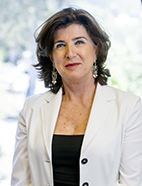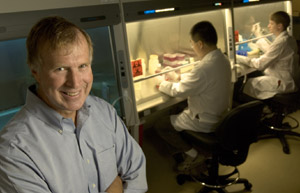Leadership
Irving Weissman, MD
Director
Virginia and D.K. Ludwig Professor for Clinical Investigation and Cancer Research
 Irving L. Weissman, MD, has directed the Institute since its founding, providing vision and leadership to build one of the nation’s top stem cell programs. In 1988, Dr. Weissman became the first to isolate in pure form any stem cell in any species when he isolated the hematopoietic or blood-forming stem cell in mice. He subsequently isolated the human hematopoietic stem cell, the human neuronal stem cell, and the human leukemia stem cell. His work has opened up an entirely new area of scientific research with enormous potential for life-saving therapies.
Irving L. Weissman, MD, has directed the Institute since its founding, providing vision and leadership to build one of the nation’s top stem cell programs. In 1988, Dr. Weissman became the first to isolate in pure form any stem cell in any species when he isolated the hematopoietic or blood-forming stem cell in mice. He subsequently isolated the human hematopoietic stem cell, the human neuronal stem cell, and the human leukemia stem cell. His work has opened up an entirely new area of scientific research with enormous potential for life-saving therapies.
Dr. Weissman recently made an exciting step toward the goal of transplanting adult stem cells to create a new immune system for people with autoimmune or genetic blood diseases. As published in the November 2007 issue of Science, his lab found a novel way to transplant new blood-forming stem cells into the bone marrow of mice without the tissue-damaging radiation or chemotherapy usually required, thereby effectively replacing their immune systems. Many aspects of this technique will need to be adapted before it can be tested in humans, but when those barriers are surmounted, the benefits could be significant. An immune system transplant, much like a liver or heart transplant, would give a person with an autoimmune disease, such as multiple sclerosis, hope for a healthy future.
Dr. Weissman received his medical degree from Stanford in 1965 and, after carrying out research in laboratories provided by the late Henry S. Kaplan, MD, joined the faculty four years later. In addition to being the Virginia and D. K. Ludwig Professor for Clinical Investigation in Cancer Research, he is a professor of pathology and developmental biology, and, by courtesy, professor of neurosurgery and of biological sciences.
Maria-Grazia Roncarolo, MD
Co-Director
George D. Smith Professor in Stem Cell and Regenerative Medicine
 Maria Grazia Roncarolo, MD, Professor of Pediatrics, is Co-Director of the Institute for Stem Cell Biology and Regenerative Medicine, Chief of the Division of Pediatric Stem Cell Transplantation and Regenerative Medicine, and Co-Director of the Bass Center for Childhood Cancer and Blood Diseases, Lucile Packard Children’s Hospital, Stanford. She leads efforts to translate scientific discoveries in genetic diseases and regenerative medicine into novel patient therapies, including treatments based on stem cells and gene therapy.
Maria Grazia Roncarolo, MD, Professor of Pediatrics, is Co-Director of the Institute for Stem Cell Biology and Regenerative Medicine, Chief of the Division of Pediatric Stem Cell Transplantation and Regenerative Medicine, and Co-Director of the Bass Center for Childhood Cancer and Blood Diseases, Lucile Packard Children’s Hospital, Stanford. She leads efforts to translate scientific discoveries in genetic diseases and regenerative medicine into novel patient therapies, including treatments based on stem cells and gene therapy.
Dr. Roncarolo, a pediatric immunologist by training, spent her early career in Lyon, France, where she focused on severe inherited metabolic and immune diseases, including severe combined immunodeficiency (SCID), better known as “bubble boy disease.” Dr. Roncarolo was a key member of the team that carried out the first stem cell transplants given before birth to treat these genetic diseases. While studying inherited immune diseases, Dr. Roncarolo discovered a new class of T cells. These cells, called T regulatory type 1 cells, help maintain immune-system homeostasis by, among other things, preventing autoimmune diseases and helping the immune-system tolerate transplanted cells and organs. Recently, she completed the first clinical trial using T regulatory type 1 cells to prevent severe graft-versus-host disease in leukemia patients undergoing allogeneic hematopoietic stem cell transplantation.
Dr. Roncarolo worked for several years at DNAX Research Institute for Molecular and Cellular Biology in Palo Alto, where she contributed to the discovery of novel cytokines and she studied the role of cytokines in induction of tolerance and in promotion of stem cell growth and differentiation.
Dr. Roncarolo developed new gene-therapy approaches, which she pursued as director of the Telethon Institute for Cell and Gene Therapy at the San Raffaele Scientific Institute in Milan. She was the principal investigator leading the successful gene therapy trial for SCID patients lacking adenosine deaminase (ADA), a severe life-threatening disorder. The trial is now considered the gold standard for gene therapy in inherited immune diseases. Under her direction, the Institute has been seminal in showing the efficacy of gene therapy for other untreatable inherited metabolic diseases and primary immunodeficiencies.
Dr. Roncarolo’s goal at Stanford is to build the teams and infrastructures to fast track stem cell and gene therapy to the clinic and to bring basic-science discoveries to patients. In addition, her laboratory continues to work on T regulatory cell-based treatments to induce tolerance after transplantation of allogeneic tissue stem cells. She recently published in Nature Medicine new biomarkers for T regulatory type 1 cells, which will be used to purify the cells and to track them in patients. She is also investigating genetic chronic inflammatory and autoimmune diseases due to impairment in T regulatory cell functions
Michael T. Longaker, MD, MBA, FACS
Co-Director
Director, Program in Regenerative Medicine
Deane P. and Louise Mitchell Professor
 Dr. Michael T. Longaker has broad experience in pediatric plastic surgery, developmental biology, epithelial biology, tissue repair and tissue engineering. He has extensive research experience in the cellular and molecular biology of extracellular matrix, with specific applications to the differences between fetal and post-natal wound healing, the biology of keloids and hypertrophic scars and the cellular and molecular events that surround distraction osteogenesis with respect to craniofacial development. Most recently, his research has focused on multipotent mesenchymal cells derived from adipose tissue and their applications for tissue repair, replacement and regeneration. He brings to Stanford his unique understanding of wound healing, fetal wound healing research, developmental biology and tissue engineering.
Dr. Michael T. Longaker has broad experience in pediatric plastic surgery, developmental biology, epithelial biology, tissue repair and tissue engineering. He has extensive research experience in the cellular and molecular biology of extracellular matrix, with specific applications to the differences between fetal and post-natal wound healing, the biology of keloids and hypertrophic scars and the cellular and molecular events that surround distraction osteogenesis with respect to craniofacial development. Most recently, his research has focused on multipotent mesenchymal cells derived from adipose tissue and their applications for tissue repair, replacement and regeneration. He brings to Stanford his unique understanding of wound healing, fetal wound healing research, developmental biology and tissue engineering.
Dr. Longaker earned his undergraduate degree at Michigan State University, (where he played varsity basketball and was a member of the 1979 NCAA Men’s Basketball Championship Team) and his medical degree at Harvard Medical School. He completed his surgical residency at the University of California, San Francisco, a residency in Plastic Surgery at NYU and a craniofacial fellowship at UCLA. The majority of his research training took place while he was a Post Doctoral Research Fellow in the Fetal Treatment Program under Dr. Michael Harrison and in the laboratory of Dr. Michael Banda in Radiobiology, both at UCSF. In December 2003, Dr. Longaker earned his MBA from University of California – Berkeley and Columbia University, in the inaugural class of their combined program. He was elected into Beta Gamma Sigma at Columbia Business School.
Michael F. Clarke, MD
Associate Director
Karel H. and Avice N. Beekhuis Professor in Cancer Biology
 In addition to his clinical duties in the division of Oncology, Michael F. Clarke, MD, maintains a laboratory focused on stem cells and the role they play in cancer. Dr. Clarke’s research is aimed at the identifications and characterization of cancer stem cells, and at increasing our knowledge of the factors that control self-renewal in normal stem cells and their malignant counterparts. A central issue in stem cell biology is increasing our understanding the mechanisms that regulate self-renewal of hematopoietic stem cells, which are required for the renewal of the blood supply over a lifetime. Dr. Clarke’s laboratory found a key gene that regulates this process, and is now investigating how the regulatory gene itself is regulated. Dr. Clarke was the first researcher to find cancer stem cells in a solid tumor (a breast cancer) and discovered that the inhibition of programmed cell death is essential for the growth of breast cancers. He also has found certain gene activity signatures that predict whether breast cancer will recur after treatment. Dr Clarke’s research has important implications for the detection, characterization and treatment of human cancers.
In addition to his clinical duties in the division of Oncology, Michael F. Clarke, MD, maintains a laboratory focused on stem cells and the role they play in cancer. Dr. Clarke’s research is aimed at the identifications and characterization of cancer stem cells, and at increasing our knowledge of the factors that control self-renewal in normal stem cells and their malignant counterparts. A central issue in stem cell biology is increasing our understanding the mechanisms that regulate self-renewal of hematopoietic stem cells, which are required for the renewal of the blood supply over a lifetime. Dr. Clarke’s laboratory found a key gene that regulates this process, and is now investigating how the regulatory gene itself is regulated. Dr. Clarke was the first researcher to find cancer stem cells in a solid tumor (a breast cancer) and discovered that the inhibition of programmed cell death is essential for the growth of breast cancers. He also has found certain gene activity signatures that predict whether breast cancer will recur after treatment. Dr Clarke’s research has important implications for the detection, characterization and treatment of human cancers.
After receiving his MD degree from Indiana University, Dr. Clarke was an Oncology Fellow at the National Cancer Institute. In 1986, he joined the faculty at the University of Michigan where he was a Professor of Internal Medicine and a Professor of Cell and Developmental Biology. In the fall of 2005 Dr. Clarke will move to Stanford University where he will direct the solid tumor cancer stem cell program and serve as Deputy Director of the Institute for Stem Cell Biology and Regenerative Medicine.

